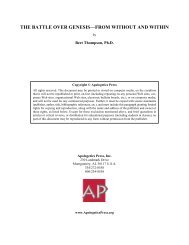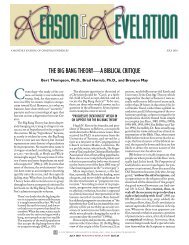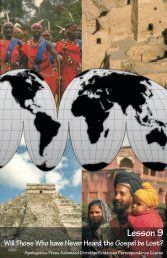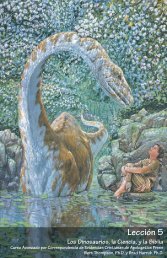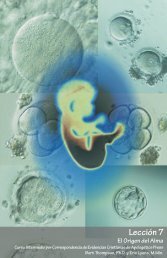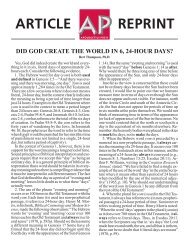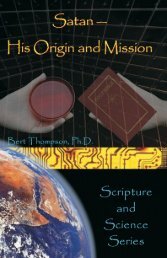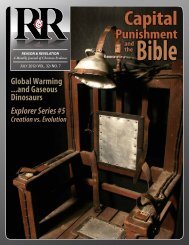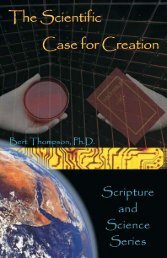The Many Faces, and Causes, of Unbelief - Apologetics Press
The Many Faces, and Causes, of Unbelief - Apologetics Press
The Many Faces, and Causes, of Unbelief - Apologetics Press
Create successful ePaper yourself
Turn your PDF publications into a flip-book with our unique Google optimized e-Paper software.
Almost imperceptibly, over a long period, a significant<br />
change had come about in the intellectual climate<br />
<strong>and</strong> with it also a change in the underst<strong>and</strong>ing <strong>of</strong><br />
God: away from the deism <strong>of</strong> the Enlightenment<br />
to a basically pantheistic attitude (1980, p. 133, emp.<br />
in orig.).<br />
I now would like to discuss the concept <strong>of</strong> pantheism in this<br />
context.<br />
Both theists <strong>and</strong> deists hold to a view which suggests that<br />
God is “out there.” In other words, He is transcendent—i.e.,<br />
beyond the world. Pantheism (pan, all; theos, God), on the other<br />
h<strong>and</strong>, teaches that God is “in here.” He is not in the least transcendent,<br />
but merely immanent—i.e., in the world. Put in the<br />
bluntest possible terms, “God <strong>and</strong> the world are so closely intertwined<br />
that you cannot tell them apart” (Corduan, 1993,<br />
p. 92). <strong>The</strong> central tenet <strong>of</strong> pantheism is that all is God <strong>and</strong><br />
God is all. <strong>The</strong> seventeenth-century philosopher, Baruch Spinoza<br />
(1632-1677), was an outspoken advocate <strong>of</strong> the concept.<br />
In commenting on Spinoza’s influence in this regard, Kung<br />
wrote:<br />
Spinoza’s God does not live apart from the universe:<br />
God is in the world <strong>and</strong> the world is in God. Nature is<br />
a particular way in which God himself exists; human<br />
consciousness is a particular way in which God himself<br />
thinks. <strong>The</strong> individual self <strong>and</strong> all finite things are<br />
not autonomous substances but only modifications<br />
<strong>of</strong> the one <strong>and</strong> only divine substance. God, then,<br />
all in all—[is] a purely immanent, not a transcendent<br />
God (1980, p. 133, emp. in orig.).<br />
While pantheism long has been associated with eastern religions<br />
such as Hinduism, Taoism, <strong>and</strong> some forms <strong>of</strong> Buddhism,<br />
in recent years it has made serious inroads into western<br />
thinking, as is evident from the teachings <strong>of</strong> the Christian<br />
Science religion, Scientology, <strong>and</strong> certain others. Its bestknown<br />
public forum today is the teachings <strong>of</strong> the New Age<br />
movement, most noticeably the writings <strong>of</strong> Oscar-winning<br />
actress, Shirley MacLaine. In her book, Out on a Limb, she<br />
told <strong>of</strong> her discussions with a friend by the name <strong>of</strong> Kevin<br />
-40



